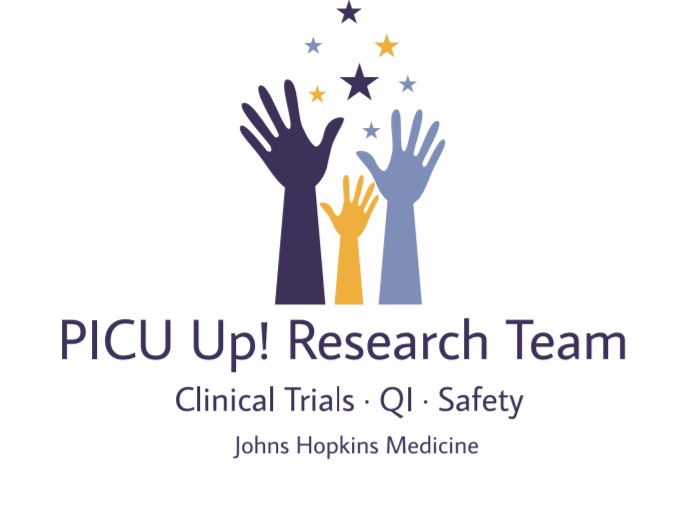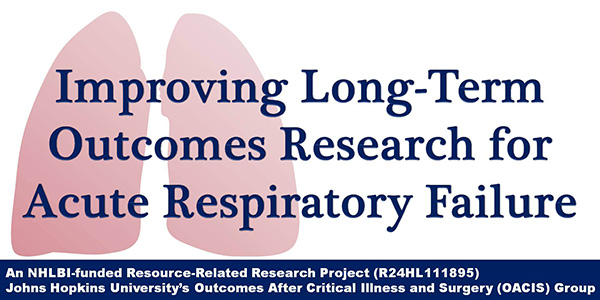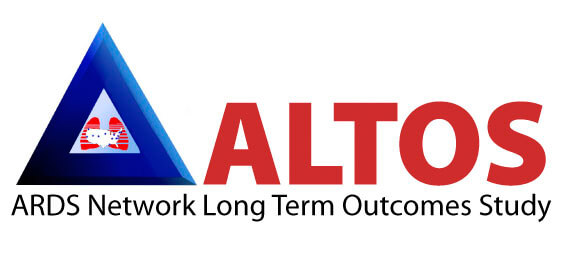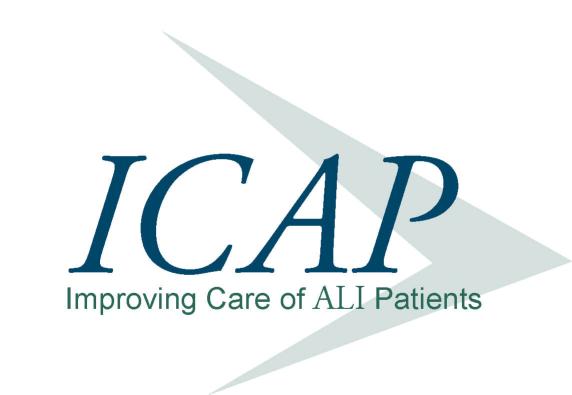OACIS Research Studies
Needham Team Receives Team Science Award

Dr. Dale Needham, professor in the Division of Pulmonary and Critical Care Medicine, and his team including Victor Dinglas and Drs. Megan Hosey Mastalerz, Ann Parker and Alison Turnbull, all in the Division of Pulmonary, were selected to receive the first-ever Team Science Award from the Institute for Clinical and Translational Research.
ARDS Recovery Study (ARS)
ARDS survivors frequently experience persistent muscle weakness and physical impairment which leads to increased disability and health care costs. To provided targeted therapy to improve these outcomes, more data are needed on the mechanisms for physical impairments among ARDS survivors.
ARS investigates physical function (Grip Strength, 6MWD, SPPB) and potential mechanisms of impairment, including: (1) inflammation (monocytes and inflammatory markers), (2) anabolic hormones, and (3) plasma biomarkers of mitochondrial myopathy at hospital discharge and 3-month follow-up, in addition to 6- and 12-month phone-based follow-up.
We will enroll 345 ARDS survivors, and with an embedded case control study of 180 ARDS survivors at 4 hospitals within Johns Hopkins Medicine and Columbia University.
Investigators: Dr. Matt Baldwin (PI - Columbia) & Dr. Dale Needham (Johns Hopkins site PI)
Status: Active, Enrolling
Funding: NIH R01HL164777
Post-extubation Assessment of Laryngeal Symptoms and Severity (PALSS)
The use of oral endotracheal tubes to provide mechanical ventilation in the intensive care unit (ICU) can be lifesaving. However, as an unintended consequence, nearly all intubated patients will have some degree of airway and voice injury. There are no guidelines for evaluation of such injury after extubation. This single site cohort study investigates the symptoms and physical characteristics of laryngeal injury and voice function after oral endotracheal intubation and mechanical ventilation in 330 patients. The outcomes of this project will assist in identifying patients with clinically important, post-extubation laryngeal injury needing further evaluation to reduce the short- and long-term harms of endotracheal tube-associated injury on the larynx and voice, and provide new data to help inform evidence-based practice.
Principal Investigators: Martin Brodsky,PhD,ScM, Vinciya Pandian,PhD,MSN, Dale Needham,MD,PhD
Status: Active, Enrollment Completed
ClinicalTrials.gov Identifier: NCT03726086
Addressing Post-Intensive Care Syndrome Among Survivors of COVID-19 (APICS-COVID)
With the COVID-19 pandemic, there is a need to better understand survivors’ longer-term outcomes, including Post-Intensive Care Syndrome (PICS), defined as new or worsened physical, cognitive and/or mental health impairments occurring after an intensive care unit (ICU) stay. ICU survivors are frequently readmitted to the hospital, commonly for preventable complications, suggesting potentially ineffective post-discharge treatment for PICS and other issues faced by these ICU survivors. This prospective, multi-center observational study of acute respiratory failure survivors with COVID-19 evaluates the relationship between unmet healthcare needs within 1 month after hospital discharge to home and survivors’ poor subsequent outcomes. This study includes Core Outcome Sets (COS) for Acute Respiratory Failure survivors (https://www.improvelto.com/coms/) and for COVID-19 survivors (https://www.comet-initiative.org/Studies/Details/1548)
Team: Dale Needham, MD, PhD (Protocol Committee Co-Chair, Data Coordinating Center Chair); Victor Dinglas, MPH (Protocol Committee and Data Coordinating Center member)
Funding: U.S. Department of Defense
Status: Active, Enrollment Completed
ClinicalTrials.gov Identifier: NCT03738774
Addressing Post-Intensive Care Syndrome (APICS-01): Multi-Center Prospective Cohort Study
Clinical advances have significantly reduced short-term mortality after critical illness. Given the growing population of survivors of critical illness, there is greater need to address Post-Intensive Care Syndrome (PICS), defined as new or worsened physical, cognitive and/or mental health impairments occurring after an intensive care unit (ICU) stay. ICU survivors are frequently readmitted to the hospital, commonly for preventable complications, suggesting potentially ineffective post-discharge treatment for PICS and other issues faced by these ICU survivors. We hypothesize that patients are not receiving the majority of their post-discharge plan; i.e., having “unmet needs” soon after discharge from hospital to home. This prospective, multi-center observational study of acute respiratory failure survivors will evaluate the relationship between these unmet needs within 1 month after hospital discharge to home and survivors’ poor subsequent outcomes.
Team:Dale Needham, MD, PhD (Protocol Committee Co-Chair, Data Coordinating Center Chair); Victor Dinglas, MPH (Protocol Committee and Data Coordinating Center member)
Funding: U.S. Department of Defense
Status: Completed
ClinicalTrials.gov Identifier: NCT03738774
Selected Publications
- Approaches to Addressing Post-Intensive Care Syndrome among Intensive Care Unit Survivors. A Narrative Review
- Association Between Unmet Nonmedication Needs After Hospital Discharge and Readmission or Death Among Acute Respiratory Failure Survivors: A Multicenter Prospective Cohort Study
- Association between unmet medication needs after hospital discharge and readmission or death among acute respiratory failure survivors: the addressing post-intensive care syndrome (APICS-01) multicenter prospective cohort study
- Evaluating the association between unmet healthcare needs and subsequent clinical outcomes: protocol for the Addressing Post-Intensive Care Syndrome-01 (APICS-01) multicentre cohort study
- Acute Respiratory Failure Survivors' Feedback on a Phone-based Follow-Up Using a Core Outcome Set
Nutrition and EXercISe in Critical Illness (NEXIS)
This multi-centered randomized controlled trial investigates whether a novel early intervention combining Intravenous (IV) amino acids plus in-bed cycle ergometry exercise improves physical outcomes in critically ill patients. We hypothesize that this innovative approach will improve short-term physical functioning outcomes (primary outcome), as well as amino acid metabolism, body composition, and patient-reported outcomes at 6-month follow-up.
Principal Investigators: Renee Stapleton,MD,PhD, Daren Heyland,MD,MSc, Dale Needham,MD,PhD
Funding: NIH/NHLBI R01HL132887
Status: Enrolling
ClinicalTrials.gov Identifier: NCT03021902
Cycling Protocol / Video
Selected Publications
- Safety and Feasibility of a Protocolized Approach to In-Bed Cycling Exercise in the Intensive Care Unit: Quality Improvement Project
- Combining nutrition and exercise to optimize survival and recovery from critical illness: Conceptual and methodological issues
- Additional Publications
Clinical Effectiveness of the “PICU Up!” Multifaceted Early Mobility Intervention for Critically Ill Children

While mortality in U.S. pediatric intensive care units (PICUs) is improving, surviving children frequently develop persistent physical, cognitive, and psychological impairments. Over half of critically ill children experience potentially preventable PICU-acquired morbidities, with mechanically ventilated children being at greatest risk. In 2014 the “PICU Up!” program was developed as the first pediatric-specific, interprofessional intervention to integrate goal-directed sedation, delirium prevention, sleep promotion, and family engagement into daily PICU care in order to facilitate early and progressive mobility. This pragmatic, stepped-wedge cluster randomized controlled trial, to be conducted at 10 academic and community hospitals in the United States, will evaluate the effectiveness of the PICU Up! intervention in decreasing mechanical ventilation duration and improving delirium and functional status.
www.ICURehabNetwork.org/PICU-Up
Team: Sapna Kudchadkar, MD, PhD (PI & Clinical Coordinating Center Chair), Dale Needham MD, PhD (Data Coordinating Center Chair), Colleen Mennie, RN (Clinical Coordinating Center Program Manager, Victor Dinglas, MPH (Data Coordinating Center member)
Funding: Eunice Kennedy Shriver National Institute of Child Health and Human Development (NICHD)
Status: In-progress
Protocol: PubMed | Article
ClinicalTrials.gov Identifier: NCT04989790
Freedom Trial: Novel Arm Restraint For Critically Ill Patients To Reduce Immobility, Sedation, Agitation and Cognitive Impairment
Physical restraints – commonly used to reduce the self-removal of endotracheal tubes, feeding tubes, and intravenous (IV) catheters – have major limitations. The most common restraints are soft wrist restraints that constrain movement of the wrist, elbow and shoulder. Especially in older patients, such restraints are associated with increased agitation and delirium, often leading clinicians to increase sedation medications. Unfortunately, such medications can further complicate the patient’s hospital stay, by prolonging bed rest, immobility and mechanical ventilation, as well as worsening associated muscle weakness and pressure ulcers.The Exersides™ restraint is a novel, adjustable arm restraint for mechanically ventilated patients, which permits arm movement while not permitting the hand to reach endotracheal or feeding tubes. The Exersides™ restraint was designed to minimally impact mobility of the upper extremity of critically ill patients. We are refining the current Exersides™ prototype to ensure comfort, stability and functionality, and will formally evaluate the feasibility and potential benefit of Exersides™ restraints in ICU patients. Thereafter, we will conduct a multi-center, randomized cross-over trial comparing the Exersides™ with traditional restraints in older, critically-ill mechanically ventilated patients.
Funding: NIH/NIA R42AG059451
Status: Active, Enrollment Completed
ClinicalTrials.gov Identifier: NCT03621475
Video of Exersides™ with simulated patient
Interview with the inventor of the Exersides™
Improving Psychological Outcomes for Acute Respiratory Failure Survivors using a Self-Management Intervention (SMARF)
A growing number of patients are surviving Acute Respiratory Failure (ARF), but may experience long-lasting psychological problems after returning home. Early, evidenced-based treatment to reduce psychological symptoms in the intensive care unit and hospital may help improve patient outcomes, but research evaluating such treatment for ARF patients is scant. This project includes qualitative research that tailors an existing psychological intervention for use in ARF patients, then subsequently conducts a pilot randomized controlled trial to evaluate the feasibility, acceptability, and potential benefit of the psychological intervention on ARF patients’ anxiety and associated outcomes at hospital discharge and 3-month follow-up.
Principal Investigator: Megan M. Hosey, PhD
Funding: Parker B. Francis Fellowship Program
Status: Currently Recruiting
BEhavioral Activation and ReHABilitation For Acute Respiratory Failure Survivors (BEHAB)
This pilot randomized controlled trial (RCT) investigates the feasibility of a combined behavioral activation – rehabilitation (BA-R) intervention in acute respiratory failure survivors. While our primary outcome is feasibility of the proposed pilot RCT, we will also evaluate, as secondary outcomes, whether BA-R will significantly lower depressive symptoms and reduce impairments in physical functioning.
Principal Investigator: Ann M Parker, MD
Status: Currently Recruiting
ClinicalTrials.gov Identifier: NCT03431493
Usability and Acceptability of a Mobile Application Prototype for a Combined Behavioral Activation and Physical Rehabilitation Intervention in Acute Respiratory Failure Survivors
Acute respiratory failure survivors experience depression symptoms and new impairments in physical function. Behavioral activation, an evidence-based non-pharmacological treatment for depression, combined with physical rehabilitation, is a promising intervention. Notably, mHealth applications (Apps) are potentially effective methods of delivering home-based interventions. The purpose of this study is to evaluate the usability and acceptability of a prototype App to deliver a combined, home-based behavioral activation and rehabilitation intervention to acute respiratory failure survivors.
Rehabilitation Mobile App: Patient Education
Principal Investigator: Dale Needham, MD, PhD
Status: Completed
Funding: This work was made possible by support from the Johns Hopkins Medicine Discovery Fund
Ganciclovir to Prevent Reactivation of Cytomegalovirus in Patients with Acute Respiratory Failure and Sepsis (GRAIL)
Each year in the US, 1 million people per year are hospitalized with sepsis, of which 40% develop acute respiratory failure requiring mechanical ventilation. At least 60% of patients with sepsis are cytomegalovirus (CMV) seropositive. This multicenter study evaluates whether administration of the existing anti-viral medicine, ganciclovir, will increase the number of days alive and free of mechanical ventilation in CMV positive, immunocompetent patients with sepsis-associated acute respiratory failure. We hypothesize that IV ganciclovir (administered early during critical illness) will suppress CMV reactivation, leading to improved clinical outcomes.
Principal Investigators (PI): Michael Boeckh, MD; Ajit Limaye, MD; Gordon Rubenfeld, MD, MS; Renee Stapleton, MD, PhD
Johns Hopkins Site PI: Dale Needham, MD, PhD
Funding: NIH/NHLBI 1UG3HL147011-01A1
Status: Enrolling
ClinicalTrials.gov Identifier: NCT04706507
Selected Publication
- Effect of Ganciclovir on IL-6 Levels Among Cytomegalovirus-Seropositive Adults With Critical Illness: A Randomized Clinical Trial
Improving Long-Term Outcomes Research for Acute Respiratory Failure

This project is funded by a NHLBI R24 grant for Investigator-Initiated Resource-Related Research Projects. This project aims to assist researchers studying acute respiratory distress syndrome (ARDS)/acute respiratory failure (ARF) patients in designing trials that appropriately evaluate long-term patient outcomes, in order to facilitate research aimed at reducing the public health burden of health impairments after these critical illnesses. This project includes: 1)creation and dissemination of a national Web-based database of validated and recommended survey instruments and clinical testing methods for evaluating ARDS/ARF survivors’ long-term physical, cognitive, and mental health outcomes; 2) development and dissemination of practical resources for maximizing retention of ARDS/ARF survivors in long-term, longitudinal research studies; and 3) evaluation, implementation and dissemination of statistical methods and programs for evaluating longitudinal functional outcomes in the presence of high patient mortality (“censoring due to death”).
Principal Investigator: Dale Needham, MD, PhD
Funding: NIH/NHLBI R24HL111895
Status: Completed, all resources freely available at www.ImproveLTO.com & via @improveLTO (Twitter)
Publications
The Roles of Response Shift & Patient Expectations for Recovery after ARDS

Acute respiratory distress syndrome (ARDS) is a life-threatening illness that usually requires ICU care. ARDS survivors frequently experience new or worsening physical, cognitive, and/or mental health impairments that last for years. However some ARDS survivors adapt to new impairments over time and report improving quality of life not explained by improvements in their physical, cognitive, and mental health.This adaption phenomenon is known as “response shift.” We are exploring whether patient characteristics prior to ARDS are associated with the magnitude of response shift experienced after ICU discharge, as well as how psycho-social factors like social support, resilience, and survivors’ expectations for recovery impact quality of life.This research uses data from the NHLBI ARDS Network Long Term Outcome Study (ALTOS) containing hundreds of data elements per patient, as well as enrolling a new prospective cohort of ICU survivors to collect data on the association between patient expectations for recovery and perceived quality of life 6 months after hospital discharge.
Principal Investigators: Alison E. Turnbull, DVM, MPH, PhD
Funding: NIH NHLBI K01HL141637
Status: Completed
Collaboration with: The Partnership for ICU Patient-Family Engagement Research (PIPER)
Selected Publications
- Health Expectations and Quality of Life After Acute Respiratory Failure: A Multicenter Prospective Cohort Study
- Fulfillment of Patient Expectations after Acute Respiratory Failure: A Multicenter Prospective Cohort Study
- Understanding Patients’ Perceived Health After Critical Illness: Analysis of Two Prospective, Longitudinal Studies of ARDS Survivors
Functional Electrical Stimulation (FES) Assisted Cycle Ergometry for Early Rehabilitation of Critically Ill Patients
This multi-centered randomized controlled trial investigates whether Functional Electrical Stimulation-Assisted Cycle Ergometry (FES-Cycling) delivered early during critical illness in mechanically ventilated patients decreases intensive care unit-acquired weakness (ICU-AW). This trial’s main outcome measures include muscle strength, muscle mass and physical functioning. In a sub-group of patients, biochemical and histological changes in muscles will be evaluated via muscle biopsy. Participants also will receive 6-month follow-up to evaluate their physical, cognitive and mental health outcomes.
Principal Investigator: Dale Needham, MD, PhD
Funding: National Health & Medical Research Council of Australia (NHMRC) APP1079460
Status: Completed
ClinicalTrials.gov Identifier: NCT02214823
Selected Publication
Recovery of Muscle after ALI (ROMA)
This study investigates changes and recovery in muscle electrophysiology and function during critical illness in order to understand mechanisms through which critical illness and ICU therapies contribute to long-term impairments in muscle strength, physical function and quality of life. Participants are drawn from the ongoing NIH-funded ARDS Network randomized controlled trials and have long-term follow-up conducted as part of the ARDS Network Long-term Outcomes Study (ALTOS – see details above).
Principal Investigators: Catherine (“Terri”) Hough, MD, MSc, and Dale Needham, MD, PhD
Status: Completed
Funding: NIH/NHLBI R01HL096504
ARDSNet Long Term Outcomes Study (ALTOS)

This study examines the long-term patient outcomes, at 6 and 12 months after enrollment into four NIH-funded ARDS Network clinical trials for acute lung injury/acute respiratory distress syndrome (ALI/ARDS) patients. Long-term outcomes of interest include measures of physical, cognitive and mental health. Participant evaluations are done via a battery of validated surveys by phone (estimated sample size = 900 from 41 hospitals at 11 study sites across United States) and for a sub-set of participants, in-person evaluation is conducted (estimated sample size = 300 from 11 hospitals at 4 study sites).
Principal Investigators: Dale Needham, MD, PhD and Ramona Hopkins, PhD
Grants: RO1-HL091760, 3R01HL091760-02S1, N01-HR-56170, and Hopkins GCRC Grant # M01-RR00052
Status: Completed
Funding: NIH/NHLBI N01HR56170, R01HL091760, and R01HL091760-02S1
ClinicalTrials.gov Identifier: NCT00719446
(ClinicalTrials.gov Identifiers for ARDSNet Trials: EDEN/OMEGA# NCT00609180, EDEN (after OMEGA termination)# NCT00883948, ALTA # NCT00434993, SAILS #
NCT00979121)
Selected Publications
- One year outcomes of initial trophic vs full enteral feeding in acute lung injury patients
- Physical & cognitive performance of ALI patients 1 yr after initial trophic vs full enteral feeding
- Risk factors for physical impairment after acute lung injury in a national, multi-center study
- Psychiatric symptoms in acute respiratory distress syndrome survivors
- Rosuvastatin for delirium and cognitive impairment in sepsis-associated ARDS
- One-year outcomes of rosuvastatin vs. placebo in sepsis-associated ARDS
Improving Care of Acute Lung Injury Patients (ICAP)

This study evaluates the effects of lower tidal volume ventilation and other aspects of critical illness and ICU care on the long-term physical and mental health outcomes of participants with acute lung injury/acute respiratory distress syndrome (ALI/ARDS). Follow-up evaluations are done at 3, 6, 12, 24, 36, 48 and 60 months after the diagnosis of ALI/ARDS.
Principal Investigators: Peter Pronovost, MD, PhD; Dale Needham, MD, PhD
Status: Completed
ClinicalTrials.gov Identifier: NCT00300248
Selected Publications
- Depressive symptoms and impaired physical function after acute lung injury
- Lung protective mechanical ventilation and 2-year survival for acute lung injury
- Post-traumatic stress disorder symptoms after acute lung injury
- Physical complications in acute lung injury survivors
- Timing of low tidal volume ventilation and ICU mortality in ARDS
- Co-occurrence of and remission from general anxiety, depression, and PTSD symptoms
- Healthcare resource utilization and costs of 2-year survivors of acute lung injury
- Additional Publications
Intensive Care Unit Sleep Quality and Neurocognitive Performance
The purpose of this study is to understand patients’ neurocognitive performance at discharge from the Medical Intensive Care Unit (MICU) and the potential effect of perceived sleep quality in the MICU on neurocognitive outcomes.
Principal Investigator: Dale Needham, MD, PhD, and Biren Kamdar, MD, MBA (Project leader)
Status: Completed
ClinicalTrials.gov Identifier: NCT01061242
Publication
Additional Publication
Checklist for Sleep Quality Improvement Project in Johns Hopkins MICU
This checklist was developed and used by Dr. Kamdar, Dr. Needham and collaborators as part of their Quality Improvement (QI) project for sleep in the Johns Hopkins Medical ICU (published in Critical Care Medicine. 2013; 41:800-809). This checklist describes the environmental modifications, non-pharmacologic sleep aids, and pharmacological guidelines implemented by ICU staff to improve and promote patient sleep in this QI project.
Use of Neuromuscular Electrostimulation for Treatment or Prevention of ICU-Associated Weakness (NMES)
The purpose of this study is to investigate whether neuromuscular electrostimulation (NMES) will decrease ICU-associated weakness. The study is a randomized clinical trial to evaluate the efficacy of twice-daily NMES versus sham therapy, applied to the bilateral lower extremities, to reduce ICU-associated weakness in patients with acute respiratory failure.
Principal Investigator: Dale Needham, MD, PhD; Michelle Kho, PT, PhD (Project Leader), Alex Truong, MD, MPH (co-investigator)
Status: Completed
ClinicalTrials.gov Identifier: NCT00709124
Glossary
Acute lung injury (ALI) is a less severe form of acute respiratory distress syndrome (ARDS). For more information on ALI and ARDS, please visit the National Heart, Lung, and Blood Institute website.
